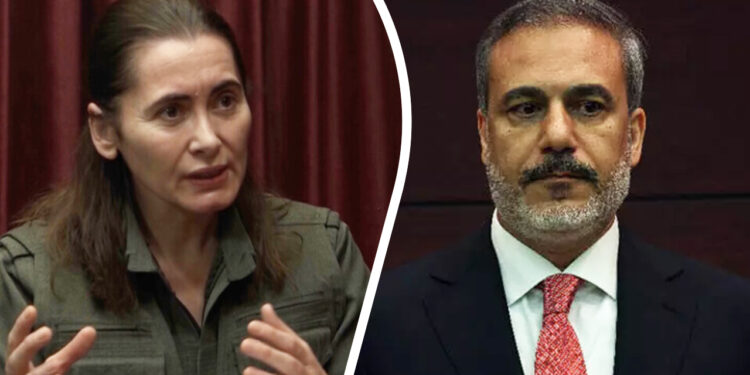Helin Ümit, a senior figure within the Kurdistan Workers’ Party (PKK), warns of Turkey’s intentions to incorporate Kirkuk into its territory. She also accuses Turkish Foreign Minister Hakan Fidan of betraying the Kurdish cause.

In a recent interview, prominent Kurdistan Workers’ Party (PKK) executive Helin Ümit warned of Turkey’s territorial designs on the Iraqi city of Kirkuk and accused Turkish Foreign Minister Hakan Fidan of betraying the Kurdish cause.
Ümit’s apprehensions are part of a larger context in which she has criticised the Turkish government’s treatment of the Kurds, and the incommunicado detention of PKK leader Abdullah Öcalan in İmralı Island Prison for the past 30 months. She emphasised the importance of Turkish intellectuals taking a stand against isolation and genocidal policies against Öcalan and the Kurdish population of Turkey.
According to Ümit, preparations are underway to declare Kirkuk as part of Turkey’s territory. “We are seeing through Turkey’s plans. We recognise the National Pact, the Mosul, Kirkuk plan. They aim to seize Mosul and Kirkuk. They intend to draw a line from the Mediterranean to Mosul; they have plans for occupation. In response, our guerrillas are demonstrating significant resistance,” she warned. “In this context, it’s important not to entertain such illusions,” she added.
“Mainly, I’m urging the Kurdish community, particularly the Kurdish people in Başur [Iraqi Kurdistan], Kurdish intellectuals and Kurdish politicians, to exercise caution. There truly exists a substantial plan for Mosul and Kirkuk. Even using a democratic Turkmen sector as a pretext, they could declare Kirkuk, which is historically part of Kurdistan, as Turkish territory. Preparations for this are in progress,” she reiterated.
Ümit also directs strong criticism at Turkish Foreign Minister Hakan Fidan, accusing him of betraying the Kurdish cause and questioning his Kurdish heritage. She asserts, “Hakan Fidan is a ‘devşirilmiş’ (forcibly assimilated) Kurd. He would not have been bestowed this role without immersing his hands in Kurdish blood.”
Turning her attention to the Barzani family—a prominent political force in the Kurdistan Region of Iraq (KRI) closely aligned with the Kurdistan Democratic Party (KDP)—Ümit questions their close relationship with Hakan Fidan. She warns, “If the Barzanîs are aligned with him, it becomes evident whose side they are on—either the Kurdish people’s or the Turkish state’s genocidal schemes.”
Ümit cautioned against underestimating the strength of the PKK and its endurance through challenging times.
As the conversation shifts to Turkey’s actions in Rojava, the northern and eastern regions of Syria, Ümit highlighted the Turkish state’s strategy of intimidation and displacement. She pointed to Afrin (Efrin) as an example of Turkey’s intentions to replace Kurdish residents with militant groups.
In her concluding remarks, Ümit warned, “Should the PKK’s influence wane, the KDP’s standing and Başûr’s status will also falter. The crux is not the PKK; the very existence of Kurds is deemed a threat by Turkish authorities.”








Leave A Comment